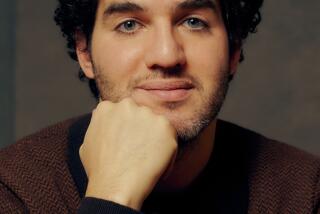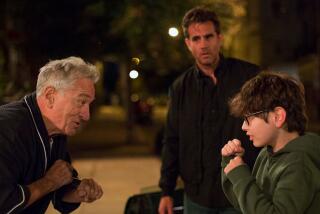Max Von Sydow, ‘the Swedish Laurence Olivier’
- Share via
One morning on the set of the recently released movie “Snow Falling on Cedars,” Max Von Sydow blackened his thumbnail. He had decided that his character, Nels Gudmundsson, the 79-year-old principled but physically frail defense attorney, had “fumbled” that day.
“He was hammering away at something and the thumb got in the way,” Von Sydow says on a recent visit to Los Angeles. At 70, he is clearly robust and not at all like his shaky character who, though mentally astute, is blind in one eye, sometimes poorly shaven and given to tottering around the courtroom as if any day could be his very last.
This attention to tiny details is typical of Von Sydow, say those familiar with his work. And it goes a long way toward explaining why many film experts consider the veteran Swedish actor to be one of the giants of international cinema.
“It’s really an adventure every time you work with Max,” says Swedish director Jan Troell, who has worked with Von Sydow since 1963, most recently in the widely praised “Hamsun” (1996). “It all seems so uncomplicated and easy when you shoot a scene. Not until I sit at the editing table can I fully understand how fascinating he is, the way he plays the part, the small details.”
Fraser Heston, who directed Von Sydow in “Needful Things” (1993) calls him “the Swedish Laurence Olivier.”
With “Snow Falling on Cedars,” based on the award-winning, best-selling novel by David Guterson, just released by Universal Pictures, Von Sydow has made almost 120 films, about a third of them in the U.S.
Although he’s had his share of working in lightweight Hollywood movies--out of “curiosity” and a need for “change,” he says--many of his films are considered classics, beginning with his early work with Swedish icon Ingmar Bergman in such films as “The Seventh Seal” (1957) and “The Virgin Spring” (1960).
Von Sydow continues to work with Bergman, most recently in “Private Confessions” (1998), written by Bergman and directed by Liv Ullman, a frequent co-star of Von Sydow’s.
His portrayal of an impoverished farm worker in “Pelle the Conqueror” (1988), by Danish filmmaker Bille August, is often called Von Sydow’s greatest role and it brought him worldwide acclaim. That role went against the grain of his usual authority figures, from priests (“The Exorcist,” 1973, and “Private Confessions,” 1996) to novelists (“Hamsun,” (1996), to the sinister Blofeld (“Never Say Never Again” 1983) to the most influential guys of all, Jesus Christ (“The Greatest Story Ever Told,” 1965) and the devil himself (“Needful Things,” 1993).
In “Snow Falling on Cedars,” Von Sydow is back in a weighty role as a small-town attorney who defends a Japanese fisherman, Kazuo (Rick Yune), against a murder charge after a local fisherman drowns under suspicious circumstances off the fictional island of San Piedro, north of Puget Sound.
Although the film weaves many strands, including the unrequited love of Ishmael, a newspaper reporter played by Ethan Hawke, for Kazuo’s wife, Hatsue, played by Youki Kudoh (“Picture Bride”), Von Sydow’s character, Nels, is clearly the moral fulcrum of the story. Nels struggles throughout the trial, and then in a powerful summation speech, to combat the racial tensions between Anglos and Japanese Americans, who are still living in the shadow of the wartime internment at Manzanar.
Casting Von Sydow in this central role was “obviously the right choice” from the beginning, says Kathleen Kennedy, co-producer of the film with her husband, Frank Marshall (“The Color Purple,” “Schindler’s List”).
“If there was any reservation, it was over whether or not we should cast a more known actor,” Kennedy says. “I mean, Max is definitely an icon, but I wouldn’t say he is someone who is mainstream. But once we had immersed ourselves in looking at examples of his work, it was clear that he was perfect” as someone with “real depth.”
For director Scott Hicks (“Shine”), Von Sydow has been an idol since he was a teenager watching Bergman movies in 1960s Adelaide, Australia. Hicks has wanted to make a movie of the book ever since he read it during a layover at Orlando Airport while he was still working on “Shine.”
“I wrote to Max and told him he had been part of my initiation into film and I would be honored if he would consider working with me. And he wrote me a very gracious letter back accepting. His response to me was he loved the role because so seldom does he get offered full human beings to play.
“It made me reflect a little on the way Hollywood has often treated foreign nationals as actors. They often get squeezed into a certain box, where they play villains or stereotypical roles.”
His role in “Snow Falling on Cedars” is hardly stereotypical.
“Nels is the character that embodies wisdom and experience,” says Kennedy. In his long summation speech, “he is acknowledging that he is the citizen in the community who can best look back over a period in history and comment on people’s moral behavior,” but not in a self-righteous manner. As in all his films, she says, “he thinks about it at a real human level.”
For Von Sydow, Nels is also “a very dear old man” and a humble figure, “a simple man in an interesting situation.”
“I’m not saying ‘simple’ in a negative way, but he’s not remarkable in any way. He’s just like any one of us.” The fact that Nels is of Scandinavian extraction also “suited me very well,” he adds.
Von Sydow worked hard to convey Nels’ combination of physical frailty and sharpness of mind. “He’s very well described in the book, so I used whatever I could.”
In his attention to details, he also says he had “wonderful advice” from Kathleen Kennedy’s father, Donald Kennedy, a retired Superior Court judge, who visited the set a number of times to ensure that all the legal particulars were accurate. The advice: “Don’t come too close to the jurors. . . . How you handle exhibit No. 3, etcetera.” Kennedy was once a small-town lawyer in Northern California and had an idea of what kind of man Nels might have been, Von Sydow says.
Everyone on the set was awed by Von Sydow’s mastery, Hicks says.
“He has such tremendous technique, but it’s all invisible. For example,” Hicks said, “Von Sydow wanted to know exactly how droopy his character’s left eyelid should be; he’s blind in one eye. He said to me, ‘Now look, would you like it like this?’ And he dropped his eyelid to half-mast and held it a few beats. ‘Or like this?’ and then he dropped it another 50%, like somebody who had a little gauge that could calibrate the eyelid at will.”
Those involved in the film say the most powerful moment of filming was Von Sydow’s closing remarks scene, which is an intensely moving plea to the jurors to lay aside their racial hatred in the interests of justice.
“It was quite extraordinary,” Kennedy says. “Whether they were working that day or not, all the members of the cast showed up. And there was complete silence on the set and everyone was just crowding round wanting to catch a glimpse of Max doing this scene.”
It proved so powerful that Hicks chose to run it uncut.
“When he delivered it, it was just the most gorgeous carpet that just unrolled in front of me. So when I came to editing, I thought it would be sacrilege to cut into it, it was so monumental.”
One actor called watching Von Sydow like being in “a master class,” Hicks says.
For example, there is a crucial sentence in the film: “Accident rules every corner of the universe except maybe the chambers of the human heart.” This encapsulates one of the film’s major themes, Hicks says, that “we can make definite decisions about what we do and who we are,” despite accidents of fate.
In the book the sentence is part of Ishmael’s thinking process, but Hicks gave the line to Von Sydow in a scene with Ethan Hawke, partly to form a father-son connection between Nels and Ishmael (who is struggling with his own father’s legacy) and also because “there are probably only two or three actors in the world who could say this without sounding like the words were pontification.”
And, Hicks says, it was Von Sydow who added the word “maybe” to the sentence--it’s not in the book--to leave a small sense of life’s uncertainties and difficulties.
That’s typical, Hicks says. “Max has the ability to take complicated thoughts sometimes and just make them very accessible and immediate and real.”
Those who work with Von Sydow also talk about his generosity of spirit and his courtesy. Troell says he’s known Von Sydow to lose his temper only once and then “for only 27 seconds,” after a day of shooting in a snowstorm for “The Emigrants” (1971).
“‘People with enormous talent can sometimes be intolerable human beings, but Max gives the lie to that,” Hicks says.
“He’s very self-effacing and very considerate of his fellow actors. I would see him talking quietly to Rick Yune, who plays Kazuo. Rick is new to the acting world, and a different person than Max would have used that to his advantage. But Max wanted to develop his relationship with Rick and with Kazuo the character. Somewhere inside, he knows that a scene is only as good as everybody in it.
“It’s the measure of the man that he has such decency about him.”
More to Read
Only good movies
Get the Indie Focus newsletter, Mark Olsen's weekly guide to the world of cinema.
You may occasionally receive promotional content from the Los Angeles Times.









